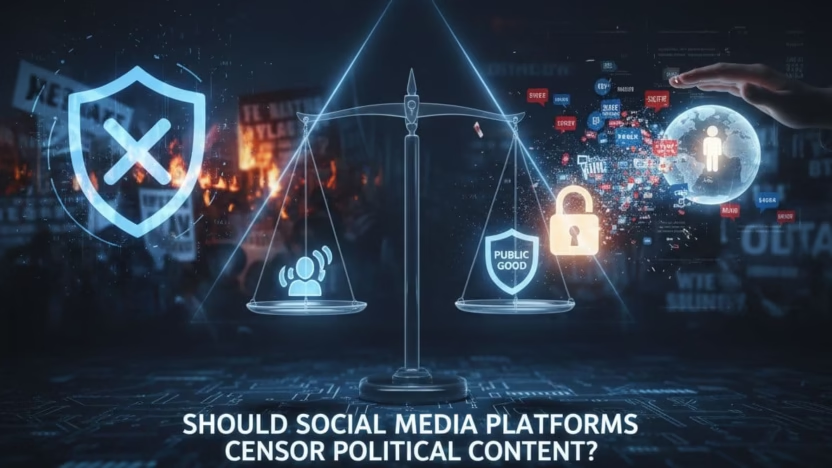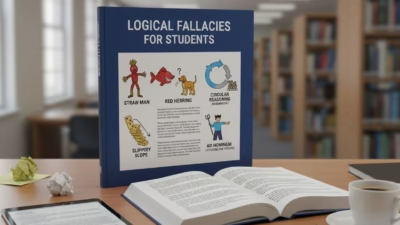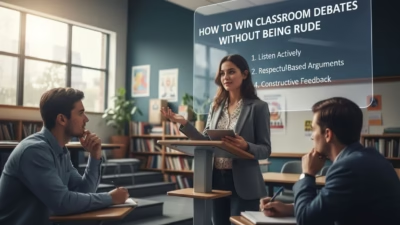Scroll through your feed during an election and it can feel like every other post is political. Some are thoughtful, some are angry, some are flat-out false. In the middle of all this noise sits a big question for students: should social media platforms censor political content, or would that damage free speech online?
This guide breaks down the key ideas in plain language, so you can form your own view and debate the topic with confidence in class, online, or at society events. You will learn how platforms currently handle political posts, what free speech really means, and what trade-offs come with stricter rules.
Whether you study politics, law, media, or you just spend too much time on TikTok and X, this is a topic that affects how you think, speak, and organise online.
Key Takeaways
- Social media political content censorship sits at the tension point between free speech and harm prevention.
- Platforms already restrict content, but the rules are often vague, inconsistent, and influenced by politics and public pressure.
- Free speech is not absolute; the law in the UK already limits speech that is threatening, harassing, or incites violence.
- Students need to think about who they trust more to judge political content, governments, private tech firms, or users themselves.
- You can protect your own expression online by learning platform rules, using strong critical thinking, and speaking up when moderation feels unfair.
Table of Contents
- Key Takeaways
- What Do We Mean By Censorship On Social Media?
- Free Speech Online: What The Law Actually Says
- Arguments For Censoring Political Content
- Arguments Against Censoring Political Content
- Finding A Middle Ground: Responsibility Without Silence
- How Students Can Protect Their Own Free Speech Online
- Frequently Asked Questions About Social Media Political Content Censorship
- Conclusion: Your Voice Matters, But So Do Your Choices
What Do We Mean By Censorship On Social Media?
Before arguing for or against censorship, it helps to know what it actually looks like in practice. On social media, censorship usually includes:
- Removing posts, comments, or videos.
- Limiting reach, for example by hiding content from recommendations.
- Labelling content as misleading or sensitive.
- Banning accounts or temporary suspensions.
Platforms say they do this to follow the law and their own community guidelines. Many have policies on hate speech, harassment, misinformation, and election interference. You can see examples of how regulators think about these issues in reports like the House of Lords Communications and Digital Committee paper on freedom of expression online.
The tricky part is that political content often sits in a grey area. A passionate opinion to one person feels like harassment to another. A “joke” meme to one group is hate speech to someone else. That is where arguments about censorship usually start.
Free Speech Online: What The Law Actually Says
Free speech is often treated like a magic phrase that ends all argument. In reality, it has limits, especially in law.
In the UK, freedom of expression is protected under Article 10 of the Human Rights Act, but that same article allows restrictions for reasons like national security, public safety, or preventing crime. So, even offline, you cannot threaten people, incite violence, or harass others and then hide behind “free speech”.
The same tension plays out in education. The Office for Students has issued guidance on how universities should handle controversial views while still protecting open debate. You can see how they frame these issues in their free speech guidance for universities and colleges.
Online, the line between free speech and harm is harder to police because:
- Content spreads fast.
- Posts can be anonymous or from bots.
- Algorithms push divisive content as it gets more engagement.
So the question is not only, “Do we support free speech?” but also, “Who decides when speech crosses the line into genuine harm?”
Arguments For Censoring Political Content
Some students feel strongly that social media platforms should take a tougher line on political posts. Here are the main reasons.
1. Protecting users from harm
Political misinformation can do real damage. False claims about voting rules can stop people from taking part in elections. Conspiracy theories can fuel harassment or even violence. When content targets minority groups, it can add to a climate of fear.
Researchers have explored how online spaces can be used to silence or attack political opponents. One study on censoring political opposition online shows how both individuals and groups can shape what others see by deleting or reporting content. That power can be misused, but it also shows why some people want stronger tools to limit harmful speech.
2. Stopping hate and extremism from spreading
Unmoderated political spaces tend to attract extreme voices. Hate speech, extremist propaganda, and calls for violence rarely stay in a small corner of the internet for long.
Supporters of stricter rules argue that platforms should:
- Remove explicit hate speech quickly.
- Down-rank accounts that repeatedly share extremist links or slurs.
- Ban groups that openly support violence.
The idea is simple. If people cannot find large audiences for violent or hateful content, they are less able to organise or intimidate others.
3. Protecting elections and democracy
Governments and researchers around the world worry about foreign interference and large-scale misinformation campaigns. Bots, fake accounts, and targeted ads can make it hard for users to tell what is genuine and what is engineered.
In this view, some political content is not really free speech at all, but a kind of information attack. Censorship then looks less like silencing opinion and more like basic defence of the democratic process.
Arguments Against Censoring Political Content
On the other side, many students are wary of calling for more censorship, even with good motives.
1. Who gets to decide what is “political”?
Almost anything can be framed as political. A post about climate change, a meme about tuition fees, or a thread about racism in football can all be tagged as political topics.
If platforms begin to censor “political content”, they might:
- Remove legitimate criticism of governments or companies.
- Silence protest movements that rely on social media to organise.
- Hit minority voices hardest, since they often already have less access to traditional media.
The fear is not imaginary. History is full of examples where censorship was used to protect those in power, not ordinary people.
2. Risk of bias and double standards
Platforms say they aim to be neutral, but their decisions often look biased. Some posts by powerful figures stay up despite breaking guidelines. Other users are banned over a single comment. Rules change fast, and enforcement is unclear.
Academic writing on free speech and social media highlights how difficult it is to balance rights and responsibilities. A useful overview is given in this short explainer on free speech and the regulation of social media content. It shows that moderation choices are rarely simple or fair in every case.
If companies have wide powers to remove political content, critics worry this bias will shape public debate in hidden ways.
3. Chilling effect on student speech
If you feel that any strong opinion might get flagged, you are less likely to share it. This is called a “chilling effect” on speech. Students may avoid:
- Posting about protests or campaigns.
- Questioning government policies.
- Sharing controversial but legal opinions in academic debates.
That harms universities as places of learning. Debate, disagreement, and even uncomfortable ideas are part of education. If platforms are too strict, students may self-censor long before any moderator steps in.
Finding A Middle Ground: Responsibility Without Silence
The most realistic future is not total free-for-all or total control. It is a messy middle. Free speech on social media must come with responsibility, both from platforms and from users. A good summary of this balance appears in a piece from LSE which argues that freedom of expression on social media must come with responsibility.
For students, a practical middle ground might look like this:
- Clearer rules, especially around elections and hate speech, explained in simple language.
- Transparent processes, where users can see why posts were removed and how to appeal.
- Stronger user controls, such as filters for certain topics, muting tools, and better blocking features.
- Better digital literacy, so people learn to check sources, spot bots, and understand how algorithms work.
This approach treats you as an active participant, not a passive consumer. Platforms carry responsibility to limit serious harm. Users carry responsibility to think carefully before sharing or reporting content.
How Students Can Protect Their Own Free Speech Online
Social media political content censorship is not only something done “at the top”. Everyday choices change what people see and what feels safe to say. Here are some simple actions that give you more control.
1. Learn the rules of each platform
Know what is allowed, what is restricted, and how to appeal decisions. Screenshots can help if content gets removed unfairly.
2. Use lists, filters, and blocking tools
You do not have to read every hot take. Curating your feed is not censorship, it is self-care. It helps your focus and mental health, especially around exam time.
3. Practise critical thinking
Before reposting a political claim, ask: Who made this? What do they gain? Can I find a credible source? This habit protects both you and your followers.
4. Speak up about bad moderation
If you think a post of yours or a friend’s was wrongly removed, challenge it. Use appeals systems, feedback tools, or student groups. Debate around moderation helps improve it.
5. Keep offline spaces for deep discussion
Seminars, student societies, and study groups can support more nuanced debate than a comment thread. Not every political thought has to live on a public feed.
Frequently Asked Questions About Social Media Political Content Censorship
Does free speech mean platforms must allow all political content?
No. Free speech in law protects you from government punishment for legal speech, but private companies can set their own rules. They still need to follow national law, but they can restrict content that breaks their policies, including political posts.
Is political misinformation illegal in the UK?
Not all misinformation is illegal. Some false claims are simply wrong, not criminal. However, content that involves fraud, incites violence, encourages terrorism, or breaks election law can be illegal and may be removed or lead to prosecution.
Are students at more risk of censorship than other groups?
Students are often very active online, so they may feel moderation decisions more often. Some topics common in student circles, like protests or campaigns, can attract reports and flags. However, the rules are not formally stricter for students than for any other user group.
Should social media platforms be treated like public spaces?
This is an ongoing debate in law and politics. Some argue that big platforms function like public squares, so they should have stronger duties to protect free speech. Others say they are private companies with the right to moderate as they see fit. The law has not fully settled this question.
How can I discuss politics online without getting banned?
Stay within the platform’s rules, avoid personal threats or targeted harassment, and back up claims with sources when possible. If you criticise policies or leaders rather than attacking individuals with slurs or threats, you are less likely to attract sanctions.
Conclusion: Your Voice Matters, But So Do Your Choices
Social media political content censorship will not be solved by one policy change or one election cycle. It sits at the centre of a struggle between free expression, safety, and power. For students, this is not just a theory question; it shapes how you learn, organise, and express your political identity.
The most useful step you can take is to stay informed, both about your rights and about the risks. Read the rules, question what you see, and talk openly with peers and tutors about where you think the line should sit.
If you treat your online voice with care, and respect that others have the same right to speak, you help build a space where disagreement is possible without silence or hate. That kind of culture will always matter more than any single algorithm update.




